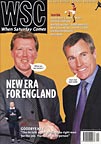 Terry Venables might be the "people's choice" for the next England manager. But he won't get the job
Terry Venables might be the "people's choice" for the next England manager. But he won't get the job
So many names have been mentioned in connection with the England job since Kevin Keegan resigned that it seems absurd (and in fact it is) to talk about there being an “obvious candidate”. Among them are: Fabio Capello, Alan Curbishley, Sven-Goran Eriksson, John Gregory, Gérard Houllier, Alex Ferguson, Roy Hodgson, Aimé Jacquet, David O’Leary, Egil Olsen, Peter Reid, Bobby Robson, Bryan Robson, Arrigo Sacchi, Alan Shearer (no, really), Berti Vogts, Arsène Wenger and Howard Wilkinson. And that list doesn’t include the two men now squeezing into the hot seat, Peter Taylor and Steve McLaren.
The “obvious candidate”, of course, is Terry Venables. He is the “people’s, players’ and managers’ favourite” according to his friends in the press, above all the News of the World. But Terry Venables is not going to be the next England manager. And since that’s the case, it’s hard to see what other job in football he is likely to fill, apart from deflecting Bob Wilson’s venomous inquisitions on Champions League nights.
It’s easy to see what people see in Venables. He’s smart but not an intellectual, tactically savvy but also one of the lads. He’s worked abroad successfully and knows foreign players, but he’s recognisably “one of us”, for the London-based press at least, a cockney archetype straight out of central casting.
The case against him is double edged. On the one hand, his critics minimise his coaching achievements. He took Barcelona to the European Cup final, Tottenham to an FA Cup triumph and England to the semi-finals of Euro 96, but that is relatively thin reward for two decades in management. Venables, at 57, is only a year younger than Alex Ferguson. When it comes to putting medals on the table, Venables’s record is more in the Roy Hodgson class – and that’s without even mentioning his recent lucrative but dismal spells at Crystal Palace and Portsmouth.
The second criticism, voiced most ferociously on 6.06 by that paragon of moral rectitude, Richard Littlejohn, is that Venables’s unorthodox business record makes him unfit for the post. Here the evidence is fairly clear, though Venables himself says the FA’s rejection of him “has nothing to do with my so-called baggage – because there isn’t any”. Venables is currently disqualified from being a company director and his evidence in the 1997 trial of his business associate Eddie Ashby was described by the judge as “at best fanciful and at worst intended… to deliberately and dishonestly mislead [the jury]”.
Does it matter? Possibly if Venables had a more sparkling record as a coach, people would be prepared to overlook his extra-curricular activities, which would be tempting but obviously hypocritical. Equally, if he had restricted himself to writing about crime and singing in nightclubs with Joe Loss, his football credentials would probably be considered adequate by England’s standards.
Probably the best argument against Venables as England manager, however, is his relationship with the press. While parts of it appear to be in his pocket, others are virulently opposed. The Sun, for example, raised the spectre of the notorious Venables gang – Ashby, Ted Buxton and Terry Fenwick – stalking the corridors of Lancaster Gate if he was rehired.
Either way, Venables would be a drama. Having actively cultivated the media throughout his career, he could not countenance the prospect of keeping a low profile. In this sense he is a man of his era, reflecting the habits of the Seventies when he first became a coach. Like the more flamboyant managerial stars of that era – Malcolm Allison, Brian Clough, Tommy Docherty – he felt the need to create a public image of himself, a persona which may or may not have corresponded with reality.
No modern manager would be allowed to emulate Alf Ramsey’s notorious hostility towards the media. But getting close to them brought with it its own dangers, which are more apparent now, when media outlets are both far more numerous and far more rapacious than they were in the Seventies.
Clearly the main criterion for the new England manager should be that he is good at the job. But perhaps a second one is that he should not be “a personality”. Whatever differences there were between Venables, Hoddle and Keegan, the one thing they had in common was that they could not keep their mouths shut. If the grossly overloaded hype around England’s performances is ever to descend to a more bearable level, they need a Mr Boring in charge.
From WSC 166 December 2000. What was happening this month